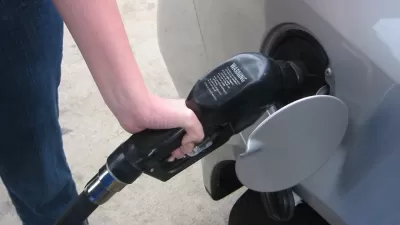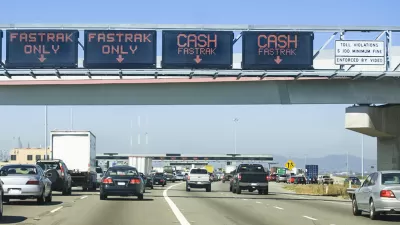Transportation ballot measures are popular this November: over 70 populate ballots across the country. In California and elsewhere, they supplement declining federal and state funds for local infrastructure.

Local transportation tax increases are generally quite popular (as tax increases go), and not just among Democrats. This November, Steve Scauzillo writes, "Nearly one-third of California's 58 counties will ask voters to approve transportation taxes, part of a record-setting number of measures appearing on ballots across the nation."
Local transit tax measures have long been on the rise. According to Jason Jordan at the Center for Transportation Excellence, if every such tax increase in the United States passes this year, they will raise $175 billion for transportation infrastructure.
On the local level, that's impressive, and necessary. Federal and state funding, which localities have come to rely on, is getting harder and harder to obtain. "In California during the last fiscal year, local funding equaled $14 billion, twice the amount of federal and state funds. The state has a $57 billion, 10-year shortfall in maintaining freeways and state highways." Part of the problem lies with the federal gas tax, which hasn't been raised for 22 years, allowing the Highway Trust Fund to deplete.
Additionally, getting federal grants in the first place often involves fronting some part of the money. "Several smaller counties, such as Placer and Humboldt, need to bank transportation dollars from local residents in order to pry even the smallest federal grant from Washington to widen a freeway or fix the potholes."
But voters appear willing to pay higher taxes to fund specific local projects. Businesses and residents can align behind the economic benefits of good local infrastructure. And, the article notes, nobody can take it away.
FULL STORY: Why everyone wants to join the transportation tax bandwagon across California, US

Alabama: Trump Terminates Settlements for Black Communities Harmed By Raw Sewage
Trump deemed the landmark civil rights agreement “illegal DEI and environmental justice policy.”

Study: Maui’s Plan to Convert Vacation Rentals to Long-Term Housing Could Cause Nearly $1 Billion Economic Loss
The plan would reduce visitor accommodation by 25% resulting in 1,900 jobs lost.

Planetizen Federal Action Tracker
A weekly monitor of how Trump’s orders and actions are impacting planners and planning in America.

Waymo Gets Permission to Map SF’s Market Street
If allowed to operate on the traffic-restricted street, Waymo’s autonomous taxis would have a leg up over ride-hailing competitors — and counter the city’s efforts to grow bike and pedestrian on the thoroughfare.

Parklet Symposium Highlights the Success of Shared Spaces
Parklets got a boost during the Covid-19 pandemic, when the concept was translated to outdoor dining programs that offered restaurants a lifeline during the shutdown.

Federal Homelessness Agency Places Entire Staff on Leave
The U.S. Interagency Council on Homelessness is the only federal agency dedicated to preventing and ending homelessness.
Urban Design for Planners 1: Software Tools
This six-course series explores essential urban design concepts using open source software and equips planners with the tools they need to participate fully in the urban design process.
Planning for Universal Design
Learn the tools for implementing Universal Design in planning regulations.
Caltrans
Smith Gee Studio
Institute for Housing and Urban Development Studies (IHS)
City of Grandview
Harvard GSD Executive Education
Toledo-Lucas County Plan Commissions
Salt Lake City
NYU Wagner Graduate School of Public Service





























